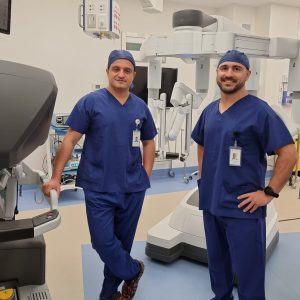ESWL (Extracorporeal Shockwave Lithotripsy)
Extracorporeal shockwave lithotripsy (ESWL) is also referred to as kidney stone shockwave treatment. The treatment involves the use of a specialised piece of equipment known as a lithotripter. The lithotripter is used to generate high frequency shockwaves, which are then directed into the body toward the kidney stones, using an ultrasound probe. The shockwaves break up the kidney stones into smaller fragments, that are then small enough to be passed through the urine.
ESWL is a technique has been used to treat kidney stones since the 1980s.
What are kidney stones and when do they require treatment?
Kidney stones develop when substances in the urine (such as calcium and other mineral) clump together to form a mass. Most stones form in the kidney, but often move into the ureter, where they are often discovered.
Most kidney stones will pass on their own without the patient knowing they were there in the first place, however in some instances, larger stones can become lodged in the urinary tract, causing a blockage, and sin some cases kidney damage or sever infection. These stones can cause a variety of symptoms, including blood in the urine, flank pain, and fever.
Kidney stones that cause pain and other health issues need to be treated, and ESWL is a safe and effective treatment that your urologist may recommend, if appropriate for your condition.

Who is suitable for ESWL?
ESWL is most suitable for patients with stones that are less than 1.5cm in diameter. ESWL may not be as effective for treating larger stones. This treatment is most suitable for patients with stones that are within the kidney, or within the ureter, close to the kidney.
The urologist will determine the patient’s suitability for ESWL, which is determine by a number of factors, which includes:
- The size and shape of the stone to be treated
- The location of the stone within the urinary tract
- The overall health of the patient
- The health of the patient’s kidney(s).
For patients in whom ESWL is not deemed to be an appropriate treatment option, the urologist will be able to recommend alternative kidney stone treatments. These may include:
- Medical expulsion therapy
- Minimally-invasive laser fragmentation (holmium laser)
- Percutaneous nephrolithotomy (PCNL) surgery.
What are the advantages of having ESWL to treat kidney stones?
The greatest advantage of ESWL is that it is a non-invasive procedure, hence there are no incisions involved, which means no hospital stay and less downtime for the patient. Since most patients do not require a hospital stay for this procedure, they are able to resume most daily activities within 1-2 days after having their treatment.
What can patients expect during and after having ESWL treatment?
Even though there are no incisions involved with the ESWL procedure, patients can still expect to receive some anaesthetic or sedation. This helps to keep the patient still and reduce any discomfort. The patient is positioned on the operating table in a way that allows the surgeon to access kidney stones with the shockwaves. An ultrasound or x-ray is then used to pinpoint the precise location of the stones, and a specialised probe is used to accurately direct the shockwave treatment to the location.
The ESWL procedure usually requires around 1000-2000 shockwaves to treat a kidney stone. The procedure typically takes 45-60 minutes to complete.
Following the ESWL procedure, patients can expect to pass small stone fragments in the urine for the next few days. Sometimes, these may cause mild discomfort as they pass. There may also be some abdominal discomfort associated with passing the stones, depending on where the stones were located. This usually feels like a dull ache, and subsides over the coming days.
You should drink plenty of water following your ESWL procedure, to help with maintaining hydration, flushing stone fragments from the urinary tract, and to assist with preventing future stone formation.
Depending on the size, location, and number of stones present, repeat treatments of ESWL may be recommended by your urologist, to break up fragments further.
